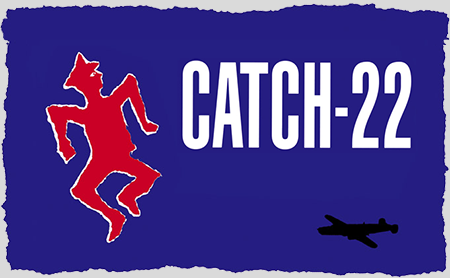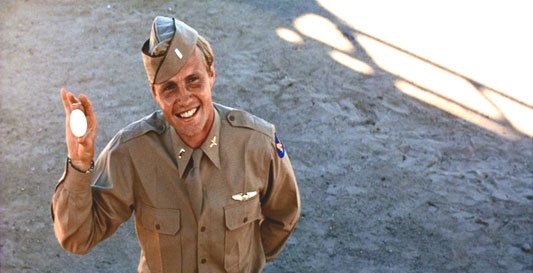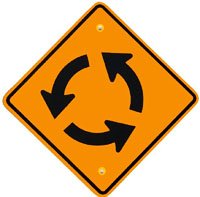What Joseph Heller's Catch-22 Can Teach us About Donald Trump
It was miraculous. It was almost no trick at all, he saw, to turn vice into virtue and slander into truth, impotence into abstinence, arrogance into humility, plunder into philanthropy, thievery into honor, blasphemy into wisdom, brutality into patriotism, and sadism into justice. Anybody could do it; it required no brains at all. It merely required no character.

Catch-22 is one of those books that, upon completing, makes you feel as if something has changed deep within yourself, or otherwise within the world. I first read it two years ago, and have re-read it three times since. To me, Joseph Heller had an innate gift for capturing basic truths about society. He tapped into the essential qualities of people and institutions– qualities that we all recognize, but can't seem to put into words. This is what, I believe, makes his work so powerful, and at certain times, his ideas seem more applicable than ever.
What is the Catch-22 about?
Catch-22 follows the story of Yossarian, a bombardier in the United States Air Force, based on the Mediterranean island of Pianosa. He is attempting to fly enough missions to reach an arbitrarily-set quota that would allow him to return home, but every time he gets close to this quota, it is simply raised. Eventually, his main goal is simply not to fly any more missions, and he uses a variety of tactics to evade his duties.
Though centered on Yosssarian, the story features an enormous array of individuals, with over 52 named characters. The majority of these characters are other members of the US Armed Forces, with a variety of ranks and titles. Heller creates an inverse relationship between these ranks and the apparent deservedness of the characters: the higher the rank, the less deserving and competent they seem to be.

Joseph Heller's Philosophy
Catch-22 initially appealed to readers because of its no-holds-barred absurdism, pervasive cynicism, and the portrayal of heroism that seemed to mock instead of revere those who die for cause. It sympathized with the motivation that young men had to go to war, yet it saw patriotism and valor as empty ideals used by politicians to manipulate young men into dying overseas. Heller understood that one of the most effective ways to convince people to believe in a cause is to give them an enemy, be it a country, the threat of terror, the arrival of immigrants, or simply 'the media'.
In the novel, Yossarian realizes that the only logical option and escape from the nightmare of war is to save oneself. He uses a variety of methods to avoid fulfilling his duty to the military, for he sees no value for duty or authority in a world where military hierarchies and self-serving politicians and institutions rule, seeing young men as simply a resource meant to be expended when necessary to further the interests of a select few.
"From now on I'm thinking only of me." Major Danby replied indulgently with a superior smile: "But, Yossarian, suppose everybody felt that way?" "Then" , said Yossarian, "I'd certainly be a damned fool to feel any other way, wouldn't I?"
Trump's Mirror Image in Catch-22

Milo Minderbinder, a fellow member of Yossarian's squadron, is a man characterized by his greed and lack of conscience. He bargains his way into the position of mess officer, giving himself control of the dining hall, and uses that to fuel his own development of what he calls M&M Enterprises. His business trades and distributes a variety of goods and services across the Mediterranean. He sells eggs, pitted dates, bed sheets, chocolate-covered cotton, green red bananas, and prostitutes, among other things. He's a capitalist at heart and is willing to sell to anyone with money (except, of course, the Russians, knowing they are communists). This includes trading with Nazi Germany, the enemy of his country and the military he belongs to.
Eventually, out of a desire to gain more control and capital, Milo's power stretches into the political sphere. He has himself appointed as Governor General of Malta, Shah of Oran, Caliph of Baghdad, Mayor of Palermo, mayor of Cairo, and a god of rain and corn in various African cultures. He's inherently self serving, and he has no concern for the people who he has authority over, yet many still idolize and support him. It is mentioned that when he arrives in his cities, holidays are declared and celebrations erupt.
At various times, Milo reassures skeptics, "What's good for M&M Enterprises, is good for the country."

I don't think I need to spell out the parallels between the current President of the United States and Milo Minderbinder. If you are interested in pursuing the possible conflicts of interest and connections between Trump's political agenda and the agenda of The Trump Organization, I'll include links at the bottom.
It's important to look at the consequences of Milo's actions in Catch-22, though he never seems to face many of those consequences himself. Milo threatens his enemies with the possibility of having to run added flight missions. He plans attacks on American bases using German planes. He defends his actions to the media by citing how much profit his syndicate has made, clearing his reputation. During a mission to Avignon, he removes survival gear from the planes to fund his enterprise, leaving apology notes that reassure the soldiers that what is good for his enterprise is good for all. He attempts to sell his cotton at the funeral of a fallen soldier. He convinces his Colonel to forbid him from flying missions, allowing him to focus on his syndicate.
Throughout all of this, he remains adamant: What is good for his enterprise, is good for the nation,
Trump's Circular Reasoning and Catch-22

There was only one catch and that was Catch-22, which specified that a concern for one's own safety in the face of dangers that were real and immediate was the process of a rational mind. Orr was crazy and could be grounded. All he had to do was ask; and as soon as he did, he would no longer be crazy and would have to fly more missions.
The term Catch-22 was coined by Joseph Heller in the novel, where it is used to describe a paradox in which all a soldier has to do to avoid flying missions is to be deemed as insane. All they have to do to be deemed as insane is ask to be evaluated for insanity. And, by asking to be evaluated for insanity, they are proving that they are concerned for their own safety and therefore have a rational, sane mind. This sort of logic is exemplified throughout Catch-22, along with other examples of logical paradoxes, fallacies, and inconsistencies. What is notable, however, is that this broken logic usually ends up working for the people delivering or enforcing it.
I highly recommend checking out Nerdwriter1's video "How Donald Trump Answers A Question". In it, he presents one of many examples where Trump's logic is emotional, self-referential, based in speculation, emotionally-driven, and circular. Other examples include:
"When was the last time anybody saw us beating, let's say, China in a trade deal? They kill us. I beat China all the time. All the time. When did we beat Japan at anything? They send their cars over here by the millions, and what do we do? When was the last time you saw a Chevrolet in Tokyo? It doesn't exist, folks."
"Free trade is terrible. Free trade can be wonderful if you have smart people. But we have stupid people."
I will build a great wall — and nobody builds walls better than me, believe me —and I'll build them very inexpensively. I will build a great, great wall on our southern border, and I will make Mexico pay for that wall. Mark my words.
In some ways, Trump's entire political existence seems to be a Catch-22. He claims he wants to be president because you can't trust politicians, because they're all self interested, because they're greedy and deceitful and incompetent. Yet he is now a fundamental part of our political system, and whether he likes it or not, he is himself a politician and has to deal with everything that entails. He also makes promises to improve the country, to make it 'great again', and when evidence arises that he may not be fulfilling that promise, he only uses it to further his argument. He immediately dissociates himself from the negative consequences of his decisions, blaming the issues that he creates on someone or something else, and asks that people support him because those very issues need to be solved.
There is little to no retribution for the wrongdoings and inequalities that Yossarian comes to realize in Catch-22. His response is to evade, to hide, and to escape. However, we aren't faced with the same hopelessness that Yossarian faced quite yet-- so long as Trump has yet to instate a marshall law and turn our democracy into a dictatorship, we have the capacity as americans to resist. To create subversive change. And, most of all, to stay sharp and continue to recognize and identify logical fallacies and examples of veiled self-interest when we encounter them, be it in the words spoken by our president, in the laws and executive actions that are proposed, and in the evolving society where media and journalism are seen as the 'enemy of the American people'.
Sources and Further Reading
http://www.thedailybeast.com/joseph-heller-catch-22-50th-anniversary-how-the-novel-changed-america
Trump + Conflicts of Interest:
http://www.bbc.com/news/world-us-canada-38069298
https://sunlightfoundation.com/tracking-trumps-conflicts-of-interest/
This is a very well thought out piece. I really appreciate how you were able to relate Catch 22 with Trump, AND include a nerdwriter1 video. I really like all the content he puts out, and I can't wait to see more of yours. Just followed.
Downvoting a post can decrease pending rewards and make it less visible. Common reasons:
Submit
I appreciate it! I love nerdwriter1 too, really awesome creator.
Thank you for the follow :)
Downvoting a post can decrease pending rewards and make it less visible. Common reasons:
Submit
This was a breath of fresh air. Amazing analysis and comparison of the book. Also fantastic to not see another deep state conspiracy relating to Trump on Steem.
Downvoting a post can decrease pending rewards and make it less visible. Common reasons:
Submit
Congratulations @bluethought! You received a personal award!
You can view your badges on your Steem Board and compare to others on the Steem Ranking
Vote for @Steemitboard as a witness to get one more award and increased upvotes!
Downvoting a post can decrease pending rewards and make it less visible. Common reasons:
Submit